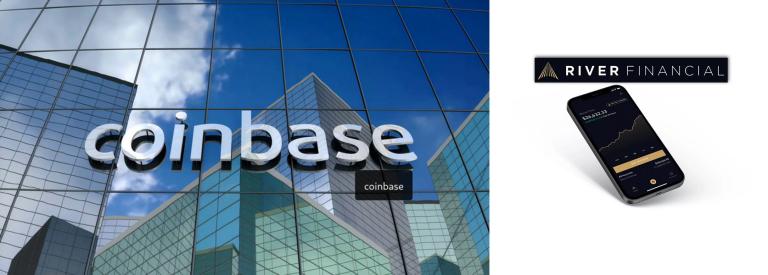Coinbase and River Financial are two distinct Bitcoin exchanges. While Coinbase offers a wide array of cryptocurrencies and serves a global audience, River Financial is a Bitcoin-only platform catering specifically to U.S. users, particularly high-net-worth individuals and serious Bitcoin investors. This comparison will provide a detailed side-by-side evaluation of their features, fees, limits, and overall value.
How Coinbase Works
Coinbase allows users to buy, sell, and trade Bitcoin along with a large variety of altcoins. To start, users sign up, verify their identity, and link a payment method like a bank account or credit card. Coinbase supports instant purchases and withdrawals, as well as recurring buys. Additionally, it offers a self-custody wallet for those who want to manage their own private keys.
Dig deeper: Coinbase Review: Buy and Sell Bitcoin
How River Financial Works
River Financial focuses exclusively on Bitcoin and offers users a streamlined process to buy Bitcoin via U.S. bank accounts. Once registered and verified, users can link a bank account and begin purchasing Bitcoin, either on-chain or through the Lightning Network. River also offers recurring buys and a target price order feature for automated purchases.
Coinbase Features
- Bitcoin and Shitcoin Support: Coinbase supports Bitcoin along with hundreds of other cryptocurrencies (shitcoins).
- Coinbase Pro: A platform for advanced traders with lower fees.
- Coinbase Earn: Allows users to earn cryptocurrency by learning through educational content.
- Coinbase Wallet: A self-custody wallet for users who want to control their private keys.
- Coinbase Card: A Bitcoin debit card offering Bitcoin rewards on purchases.
- Private Client Services: Tailored services for high-net-worth individuals.
River Financial Features
- Bitcoin Only: River exclusively supports Bitcoin, focusing on providing the best services for Bitcoin investors.
- Bitcoin Mining Hosting: Users can host mining hardware through River.
- Performance Tracking Tool: Allows users to monitor their Bitcoin portfolio’s performance.
- Private Client Services: Specialized services for those buying more than $100,000 in Bitcoin.
- Tax Optimization: Simplifies tax reporting with Form 1099-B for U.S. customers.
- Bitcoin Inheritance: Users can designate beneficiaries for their Bitcoin holdings.
Coinbase Fees
Coinbase charges fees based on transaction size and payment method. Fees vary, with credit card transactions typically incurring higher fees than bank transfers. For larger transactions, Coinbase Pro offers lower fees.
River Financial Fees
River Financial has a transparent fee structure based on order size, with zero fees for recurring purchases through its Dollar Cost Averaging program.
| Order Size | River Fee |
|---|---|
| Less than $250,000.01 | 1.20% |
| Between $250,000.01 and $1,000,000 | 1.00% |
| Between $1,000,000.01 and $5,000,000 | 0.90% |
| More than $5,000,000 | 0.80% |
Coinbase Limits
Coinbase limits depend on factors such as account verification level, payment method, and location. These limits vary widely but can be increased by verifying your identity.
River Financial Limits
River Financial imposes high limits, catering to larger-volume traders.
- Minimum Buy/Sell: $10
- ACH Weekly Limit: $150,000
- Instant Buy Limit: $100,000 per business day
Can You Trust Coinbase? Is Coinbase Safe?
Coinbase is a regulated platform that complies with KYC/AML regulations. It stores the majority of its users’ funds in cold storage. However, Coinbase has faced criticism for account lockouts and slow customer service. Coinbase also offers a self-custody wallet for users who prefer to manage their private keys.
Is River Financial Safe?
River Financial is a custodial exchange, meaning users do not control their private keys. It secures Bitcoin in cold storage with multi-signature security and provides 2FA for user accounts. River is regulated and compliant with U.S. financial regulations, making it a safe platform for storing Bitcoin.
Coinbase vs River: Table of Key Differences
| Feature | Coinbase | River Financial |
|---|---|---|
| Supported Cryptocurrencies | Bitcoin and many altcoins | Bitcoin only |
| Fee Structure | Varies by payment method and amount | Fixed fees, zero-fee DCA program |
| Limits | Depends on verification and location | Higher limits for large traders |
| Private Client Services | Yes, for high-net-worth individuals | Yes, with personalized support |
| Custodial Wallet | Yes, but offers a self-custody option | Custodial only |
| KYC/AML Compliance | Yes | Yes |
| Customer Service | Mixed reviews | Personalized support |
| Lightning Network | No | Yes |
Is River Better Than Coinbase?
Coinbase and River Financial both serve different segments of Bitcoin users. Coinbase offers a broader range of cryptocurrencies and a user-friendly interface suitable for beginners and a global audience. However, offering other cryptocurrencies in addition to Bitcoin can be a disadvantage for serious Bitcoin-only traders and beginners, who might feel overwhelmed and confused by the altcoins that Coinbase promotes
Moreover, its fees are higher, and users need to rely on Coinbase’s custodial services unless they use the self-custody wallet. Additionally, Coinbase has had issues with customer service and account lockouts. It’s worthy noting that Coinbase offers Bitcoin rewards for using their Bitcoin debit card, which can be an attractive feature for users seeking extra value.
On the other hand, River Financial is a U.S.-only, Bitcoin-focused platform tailored for high-net-worth individuals and serious Bitcoin investors. It offers a competitive fee structure for large purchases and specialized services like Bitcoin mining hosting and inheritance planning. While it is custodial, River’s high limits, tax optimization features, and focus on Bitcoin make it a strong option for those serious about Bitcoin investment.
If you regularly trade large volumes of Bitcoin as a high-net-worth individual, River’s higher purchase limits could be a significant advantage. Additionally, if you engage in recurring daily, weekly, bi-weekly, or monthly buys, there are no fees associated with these transactions.
For U.S.-based Bitcoin investors, River Financial stands out for its specialized focus and services.



























